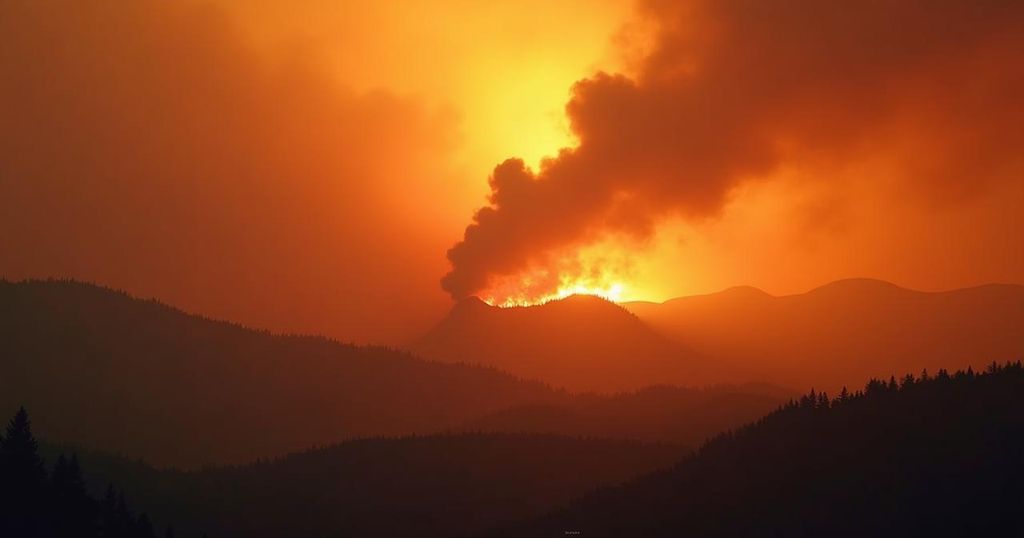The Cry of the Amazon: Wildfires Plague South America, Urging Urgent Action
The health of the environment in South America is rapidly deteriorating as destructive wildfires, primarily attributed to man-made causes, shroud regions in smoke, impacting air quality and public health. Cities across the continent, particularly in Brazil and Peru, are experiencing emergency conditions due to these fires, which are exacerbated by climate change and agricultural practices. Leaders and health officials warn of the dire consequences if urgent action is not taken to protect both the environment and the communities that rely on it.
The sky over Rondônia, a Brazilian region within the Amazon rainforest, has been obscured by smoke due to intensifying wildfires that have ravaged large portions of South America. These fires, stemming from both drought and human activities, have impacted cities from Ecuador to Paraguay, rendering the once vibrant blue sky unrecognizable. In Porto Velho, the capital of Rondônia, emergency situations have arisen as schools close and hospitals report a spike in respiratory illnesses attributable to the toxic smoke, with health professionals urging immediate attention towards this pressing crisis. Dr. Lilian Samara de Melo Lima, a local physician, expressed deep concern over the unprecedented nature of this year’s wildfires which are fueled by reckless agricultural expansion and climate change-related droughts. `We’re breathing in so much detritus,’ stated Marilene Penati, the health secretary of Porto Velho, highlighting the unbearable conditions faced by residents. As fires rage across the continent, scientists such as Erika Berenguer from Oxford University emphasize that the crisis is not limited to Brazil and is part of a wider continental disaster. Notably, Paraguay’s Chaco forest has experienced devastating destruction with significant land lost due to agricultural fires. Illustrating the humanitarian impact, José Fernando Jurumi, leader of the Ayoreo community, lamented the loss of territory for isolated Indigenous groups, raising concerns over their survival. In Peru, the destruction has been severe, with states of emergency declared in multiple regions and assertions by authorities that land clearing for farming practices is exacerbating the issue, despite differing opinions from experts on the appropriateness of such traditional practices. In Germany, the horrific situation continues to escalate, with fires devastating areas previously characterized by rich biodiversity and culture. Paramedics like Christian Rivera have witnessed the emergency’s unprecedented scale, reiterating its connection to global climate change. Echoing these sentiments, Bolivian leadership is taking proactive measures as vast wilderness areas burn. Health secretary Penati underscores that `the Earth is sick… the Earth is crying out for help,’ a dire reminder of the urgent need for collective global response. All parties affected are calling for immediate action to safeguard their homes and nations against this ongoing calamity.
The unprecedented wildfires ravaging South America, particularly in the Amazon region, have emerged as a significant environmental crisis, exacerbated by both man-made activities and natural climatic phenomena. This crisis not only devastates local ecosystems but also poses severe health risks to residents in affected areas. The fires’ increase in frequency and intensity is a result of prolonged droughts, significant land clearing for agriculture, and the encroachment of humans into previously untouched regions. The interconnectedness of these issues highlights the urgent need for comprehensive environmental policy and international cooperation to address climate change and its devastating impact on vulnerable regions.
This article delineates the alarming environmental crisis facing South America due to rampant wildfires, significantly affecting health, biodiversity, and Indigenous cultures. As the once blue skies become shrouded in smoke, residents from Ecuador to Paraguay express their anguish over the worsening conditions. The overwhelming evidence suggests that immediate decisive action is required to address the underlying causes, primarily driven by climate change and unsustainable land-use practices. Urging for collective action, local health officials and community leaders implore both regional and global stakeholders to reassess priorities regarding environmental conservation and climate action in light of this calamity.
Original Source: www.theguardian.com




Post Comment